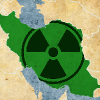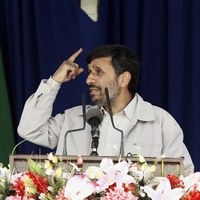![]()
Sun, Aug 28, 2011 | The Meir Amit Intelligence and Terrorism Information Center
End of Gaddafi era: Iranian media on developments in Libya
In recent days the Iranian media has given considerable attention to the developments in Libya, expressing satisfaction with Gaddafi’s fall while voicing concerns over the possibility of the Western world taking advantage of the internal situation in Libya.
Conservative media portrayed the fall of the Libyan dictator as yet another expression of the “Islamic awakening” sweeping the Arab world these past several months, stressing that the Libyans took to the streets and celebrated Gaddafi’s fall with calls of “Allah Akbar” (Fars, August 22).
While expressing satisfaction with the fall of Libya’s ruler, the Iranian media took a strongly critical stance towards the Western involvement in that country. The media claimed that Western countries had supported Gaddafi for years, and that their change of stance in recent months was motivated solely by the desire to take advantage of the new developments to further the interests, mainly economic, of the West.
The conservative Mehr News Agency said that the policy of the Western world towards Libya is a reflection of its double standard. Until recently, the Western countries that supported the revolutionists in Libya in recent months were considered the most significant trading partners of the Libyan regime, and had even signed hundreds of millions of dollars’ worth of contracts with it. According to Mehr, the policy pursued by the West shows that it takes advantage of any situation for its own interests, and that the aim of Western countries’ support for the Libyan revolutionists is to take control of Libya’s oil resources (Mehr, August 22).
The Alef website also warned about the Western plans for Libya. An editorial written by Mojtaba Ferdowsi-Pour, head of the Persian Gulf Department of Iran’s Foreign Ministry, says that the West, which suffered a blow after the fall of the Tunisian and Egyptian regimes, is now trying to regain control through internal wars and tribal and national conflicts. The aim of the Western countries’ military involvement in Libya is to obtain an opportunity to take advantage of the popular uprising for their own interests. Ferdowsi-Pour warned about the possibility of the situation in Libya turning into the same kind of situation that arose in Iraq after Saddam Hussein’s fall, when control of the country was given to the American military governor. The countries of the region must be careful not to trust their fate to the Western occupation forces, he said (Alef, August 22).
The daily Jomhuri-ye Eslami also warned about attempts by the West to take advantage of Libya’s difficult internal situation to take control of the country. The future now facing Libya is highly dangerous considering the immense devastation it suffered in recent months; it is in danger of yielding to imperialism and to the aspirations of the Western world, which seeks to rob the country of its treasures and influence its future. The daily strongly condemned Gaddafi for his uncompromising conduct in recent months, saying that the man formerly viewed as a revolutionist and Libya’s savior from imperialism ultimately ended up on the list of history’s most notorious dictators (Jomhuri-ye Eslami, August 23).
Conservative media also mentioned Israel in connection with the overthrow of Gaddafi, who was accused of cooperating with it. In its editorial, the daily Resalat said that the fall of the Libyan ruler on the eve of the international Quds Day is good news for the world’s Muslims, since he was one of the secret allies of the “Zionist regime” (Resalat, August 23). The Raja News website claimed that Israel even attempted to help Gaddafi save his regime. On February 18, Raja News reported, Israeli leaders held a special meeting where they decided to dispatch African mercenaries to Libya to help the dictator suppress the popular revolution. According to the website, Military Intelligence director Aviv Kochavi said at the meeting that the Libyan revolution carried an Islamic character (Raja News, August 22).
Some Iranian media took the opportunity to express their hope that Gaddafi’s fall will make it possible to bring closure in the disappearance of Musa Sadr, the Shi’ite leader in Lebanon, who disappeared during a visit to Libya in 1978. The capture of Musa Sadr in the first days of the Islamic revolution in Iran was, according to the daily Resalat, the greatest service Gaddafi had ever done for the West and for Israel. The most pressing task right now is to go through Libyan prisons and locate the founder of the popular resistance against Israel in Lebanon. If he is still alive, information on his current whereabouts has to be obtained; if he is dead, the location of his burial site has to be found (Resalat, August 23).
Those media affiliated with the reformist opposition also widely covered Gaddafi’s fall; however, in general they chose not to draw parallels between the fall of the Libyan regime and internal political developments in Iran. The reformist daily Sharq argued that the fall of the Arab regimes is a result of their unwillingness to engage in a dialogue with the opposition in the first stages of the political struggle, their refusal to implement necessary political reforms, and their disregard for citizens’ demands. In what could be construed as a reference to the political reality in Iran, Sharq added that the fall of the Gaddafi regime has proven that even the military cannot provide a safe haven for regimes that ignore the demands of the people (Sharq, August 23).



 RSS
RSS











End of #Gaddafi era: Iranian media on developments in #Libya | #Iran http://t.co/hKe21om
End of #Gaddafi era: Iranian media on developments in #Libya | #Iran http://t.co/hKe21om
End of #Gaddafi era: Iranian media on developments in #Libya | #Iran http://t.co/hKe21om